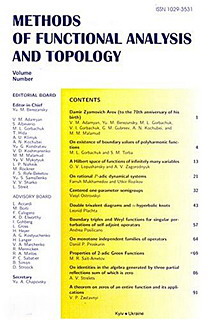Vol. 18 (2012), no. 1
Anatolii Gordeevich Kostyuchenko
MFAT 18 (2012), no. 1, 1-3
1-3
On the completeness of general boundary value problems for $2 \times 2$ first-order systems of ordinary differential equations
A. V. Agibalova, M. M. Malamud, L. L. Oridoroga
MFAT 18 (2012), no. 1, 4-18
4-18
Let $B={\rm diag} (b_1^{-1}, b_2^{-1}) \not = B^*$ be a $2\times 2$ diagonal matrix with \break $b_1^{-1}b_2 \notin{\Bbb R}$ and let $Q$ be a smooth $2\times 2$ matrix function. Consider the system $$-i B y'+Q(x)y=\lambda y, \; y= {\rm col}(y_1,y_2), \; x\in[0,1],$$ of ordinary differential equations subject to general linear boundary conditions $U_1(y) = U_2(y) = 0.$ We find sufficient conditions on $Q$ and $U_j$ that guaranty completeness of root vector system of the boundary value problem. Moreover, we indicate a condition on $Q$ that leads to a completeness criterion in terms of the linear boundary forms $U_j,\ j\in \{1,2\}.$
Linearization of double-infinite Toda lattice by means of inverse spectral problem
MFAT 18 (2012), no. 1, 19-54
19-54
The author earlier in [3, 4, 6, 7] proposed some way of integration the Cauchy problem for semi-infinite Toda lattices using the inverse spectral problem for Jacobi matrices. Such a way for double-infinite Toda lattices is more complicated and was proposed in [9]. This article is devoted to a detailed account of the result [3, 4, 6, 7, 9] . It is necessary to note that in the case of double-infinite lattices we cannot give a general solution of the corresponding linear system of differential equations for spectral matrix. Therefore, in this case the corresponding results can only be understood as a procedure of finding the solution of the Toda lattice.
Kawasaki dynamics in the continuum via generating functionals evolution
D. L. Finkelshtein, Yu. G. Kondratiev, M. J. Oliveira
MFAT 18 (2012), no. 1, 55-67
55-67
We construct the time evolution of Kawasaki dynamics for a spatial infinite particle system in terms of generating functionals. This is carried out by an Ovsjannikov-type result in a scale of Banach spaces, which leads to a local (in time) solution. An application of this approach to Vlasov-type scaling in terms of generating functionals is considered as well.
Inverse eigenvalue problems for nonlocal Sturm-Liouville operators on a star graph
MFAT 18 (2012), no. 1, 68-78
68-78
We solve the inverse spectral problem for a class of Sturm--Liouville operators with singular nonlocal potentials and nonlocal boundary conditions on a star graph.
Eigenvalue asymptotics of perturbed self-adjoint operators
MFAT 18 (2012), no. 1, 79-89
79-89
We study perturbations of a self-adjoint positive operator $T$, provided that a perturbation operator $B$ satisfies the "local" subordinate condition $\|B\varphi_k\| \leqslant b\mu_k^{\beta}$ with some $\beta<1$ and $b>0$. Here $\{\varphi_k\}_{k=1}^\infty$ is an orthonormal system of the eigenvectors of the operator $T$ corresponding to the eigenvalues $\{\mu_k\}_{k=1}^\infty$. We introduce the concept of $\alpha$-non-condensing sequence and prove the theorem on the comparison of the eigenvalue-counting functions of the operators $T$ and $T+B$. Namely, it is shown that if $\{\mu_k\}$ is $\alpha-$non-condensing then $$ |n(r,T)- n(r, T+B)| \leqslant C\left[ n(r+ar^\gamma,\, T) - n(r-ar^\gamma,\, T) \right] +C_1 $$ with some constants $C, C_1, a$ and $\gamma = \max(0,\, \beta,\, 2\beta +\alpha -1)\in [0,1)$.
Recovering arbitrary order differential operators on noncompact star-type graphs
MFAT 18 (2012), no. 1, 90-100
90-100
We study an inverse spectral problem for arbitrary order ordinary differential equations on noncompact star-type graphs. As the main spectral characteristics we introduce and study the so-called Weyl-type matrices which are a generalization of the Weyl function for the classical Sturm-Liouville operator. We provide a procedure for constructing the solution of the inverse problem and prove its uniqueness.


